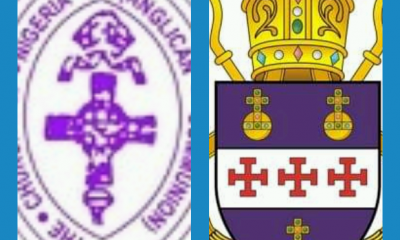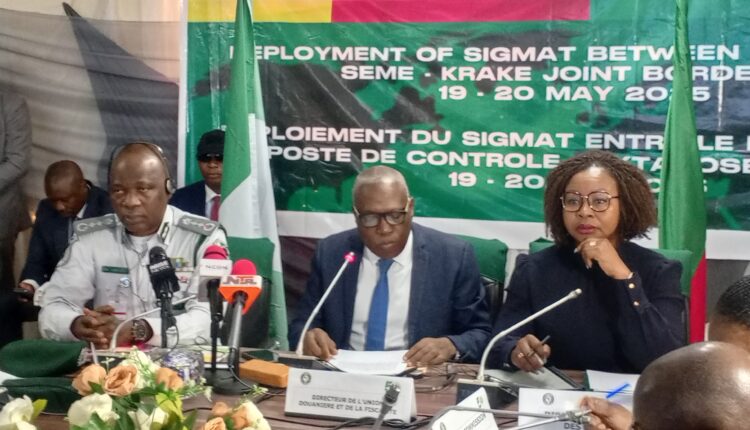By Ezurike Ugochukwu
The Nigeria Customs Service (NCS) and the Benin Republic Customs Administration in an efforts to harness the gains of the over $3.4 trillion in the Africa Continental Free Trade Agreement (AfCFTA) trade have flagged off a seamless digitalised cross-border trade facilitation process, tagged SIGMAT Connectivity.
to enable both countries to tap into the $3.4 trillion Africa Continental Free Trade Agreement (AfCFTA) trade.
AFCFTA the largest free trade area established in terms of geographical spread and the number of participating countries creates a market of 1.3 billion people and a combined gross domestic product (GDP) of $3.4 trillion.
Six West African countries, namely Nigeria, Benin Republic Togo, Ghana, Côte d’Ivoire, and Burkina Faso are now on the SIGMAT Connectivity trade platform to hanace the full potential of the AfCFTA established in 2018 and made operationalised in January 2021.
 The deployment of the SIGMAT initiative in some West Coast nations was to address raging issues of goods diversion and loss of revenue in Benin.
The deployment of the SIGMAT initiative in some West Coast nations was to address raging issues of goods diversion and loss of revenue in Benin.
SIGMAT interconnectivity refers to the System for Interconnected Management of Goods in Transit was coming amidst complaints of multiplicity of checks and inefficiency at the Nigeria-Benin border posts.
Recently, President of the Economic Community of West African States Commission, Dr Omar Touray, decried the decay at the Nigeria-Benin Republic border post, describing it as unacceptable.
“This is one of the busiest and most strategic border posts in West Africa. And yet, we are faced with expensive facilities – scanners, lighting systems and bridges that are simply not working. That is unacceptable,” he said, during a visit to the Nigeria-Benin Republic Border Post, calling for urgent reforms to safeguard the region’s free movement agenda.
He also flayed the multiplicity of checkpoints along the corridor, saying the situation hampers trade facilitation.
Speaking on Monday during the launch in Seme-Krake Joint Border Post,
Comptroller-General of the Nigeria Customs Service, Bashir Adewale Adeniyi, while speaking during the launch in Seme-Krake Joint Border Post, stated that SIGMAT Connectivity marks a major milestone in Nigeria and Benin Republic’s collective pursuit of seamless trade integration and regional economic transformation across West Africa.
The CGC explained that the successful launch of SIGMA will eliminate the diversion of cargo and loss of revenue accruing to both countries.
“It gives me pleasure to be here in Seme this morning, and I am indeed very glad to start by acknowledging the gesture of my colleague, the DG of the Customs Administration of Benin Republic, to work together for our collective efforts, which we have taken to address cross-border issues affecting the two customs administrations.
“I want to welcome you all to the official launch of the SIGMAT connectivity between our two countries. What we are doing today marks a major milestone in our collective pursuit of seamless trade integration and regional economic transformation across West Africa.
“The concept was conceived over a decade ago, and the platform, the electronic platform, was designed to achieve a number of objectives. Primarily, we want to improve the visibility of goods in transit. We want to combat diversion and fraud along the Nigeria-Benin corridor. We also want to use the platform to foster inter-agency coordination and collaboration between us and our stakeholders.
“We want to simplify the procedures at the borders, and by so doing we want to reduce delays, and most importantly, because we believe that trade fosters revenue and prosperity, we want to enhance free facilitation between our two different countries.”
He explained that the implementation of the initiative has commenced in a number of African states including Niger, Cote d’Ivoire, Mali, Ghana and Togo with the support and assistance of the ECOWAS Commission and the German Development Corporation GIZ.
“For us in Nigeria, SIGMAT reflects our strategic ambition to align with regional digital customs standards and modernisation of our trade corridor.
“We are happy that we have some achievements that we can highlight, which include the development of the SIGMAT application which is currently standing alone and tailored for Nigerian Customs landscape, the successful testing of real-life transit messages exchanged between us in Nigeria and our colleagues in the Republic of Benin, the marking and harmonization of entry and exit itineraries at this particular border station, the establishment of direct connectivity to the ECOWAS electronic hub, ensuring regional interoperability and the strengthening of collaboration between our customs administrations through the various technical meetings and consultations over the last months.
“In the process of doing this, we have encountered a number of challenges and I’m hoping that during the presentation of the SIGMAT application, we will be able to address those challenges.
“But the most important one is that we will have to do more robust training and sensitisation of our stakeholders. We will have to put in place a robust stakeholder engagement to ensure that we carry not only those economic operators but also other agencies of government that will be involved in this.
“As a way forward, Nigeria Customs Service is looking ahead with a lot of optimism and we believe that in the near future, we will be able to expand the deployment of SIGMAT to additional border locations, particularly places like Giro and the new place that we’re planning to develop in Samia.
“We will look forward to strengthening bilateral communication mechanisms to ensure timely technical engagements between our customs administrations.
“Very importantly, we will look forward to collaborating with GIZ and ECOWAS on capacity building programmes and centralisation of stakeholders.
“Of course, as we deploy these pilots, we will look forward to establishing a task force that will be charged with the responsibility of monitoring deployments, reporting successes and challenges that we have.
“For the purpose of governance, we will continue to engage with the ECOWAS SIGMAT Steering Committee to share lessons learned and support other members in their implementation journey.
“Our launch today is more than just a technical achievement. It is a powerful demonstration of regional solidarity and institutional leadership. I urge us all to harness the momentum of this milestone to transform our trade corridors into engines of prosperity, security and opportunity for the people of West Africa.”
Also speaking, the DG of the Benin Republic Customs Administration, Adidjatou Hassan Zanouvi explained that SIGMAT will facilitate the movement of goods and also help fight against fraud, frustrating seamless trans-border trade.
“We are here today for the technical launch of the SIGMAT platform, which is a very important milestone for the cooperation and the interoperability between Benin and Nigerian customs, because it will facilitate the movement of goods and also help our customs services to fight against any fraud.
“It will also help in collecting revenue and facilitate trade. The system will really solidify and facilitate the movement of goods from Abidjan, which is already in the SIGMAT system, all the way to Benin and then to Nigeria.
“Also, when goods are coming from Nigeria to us via the corridor, SIGMAT will facilitate. So this is why we are here today, and we are really optimistic about what will be, after the launch; how people will use the system, and we are really putting an emphasis on the training, the sensitisation of all the stakeholders,” the Benin Republic Customs Administration DG stated.
Lending thier voices, freight forwarders from Nigeria and BeninRwpublic have these to say: A former Chairman of the Association of Nigeria Customs Licence Agents (ANCLA), Alhaji Azeez Bamidele, expressed his reservation on the operationalization of SIGMAT interconnectivity.
He explained that though the process will help streamline the process of documentation of consignments exiting or entering Nigeria, there should not be network glitches.
He stated that SIGMAT, which refers to the System for Interconnected Management of Goods in Transit, is a digital platform introduced by the ECOWAS to track cargo movement electronically across member states.
“It is a welcome development, as it will enable customs from both countries to perform single documentation of consignments.
“What is cleared in Nigeria will be automatically transmitted to the Benin Republic Customs Administration portal. In a nutshell, it will be a single-window system.
“I doubt if we are using 4G or 5G network. If not, what happened about two years ago when this same single window documentation between Nigeria and Benin Republic was first introduced.
“There was no network to perform the operation when it was being tested then. It is going to contribute to the ease of doing business at the border if these identified challenges had been addressed,” he added.
While giving some of the key features of SIGMAT, Dansis Dansu, a freight forwarder from Benin Republic who was on ground to witness the launch, explained that it allows for real-time tracking of goods in transit, reducing the risk of smuggling and enhancing border security, adding that both countries will use a single platform for trade transactions, streamlining processes and minimising paperwork.
“Declarations made for imports transiting from either country will be electronically shared, promoting transparency and efficiency and also enabling effective risk management, reducing the likelihood of corruption and revenue loss,” he said.
Dansu, who also outlined some of the benefits of SIGMA interconnectivity, stated that it would promote transparency in trade transactions, while also reducing the risk of corruption and smuggling.

 Business5 years ago
Business5 years ago
 News6 years ago
News6 years ago
 Crime2 years ago
Crime2 years ago
 News1 year ago
News1 year ago
 News5 years ago
News5 years ago
 Football6 years ago
Football6 years ago


 The deployment of the SIGMAT initiative in some West Coast nations was to address raging issues of goods diversion and loss of revenue in Benin.
The deployment of the SIGMAT initiative in some West Coast nations was to address raging issues of goods diversion and loss of revenue in Benin.














